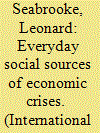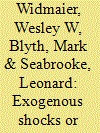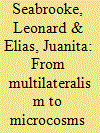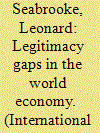|
|
|
Sort Order |
|
|
|
Items / Page
|
|
|
|
|
|
|
| Srl | Item |
| 1 |
ID:
108097


|
|
|
| 2 |
ID:
079947


|
|
|
|
|
| Publication |
2007.
|
| Summary/Abstract |
Who drives domestic institutional change in the face of international economic crisis? For materialists, self-interested actors struggle for material gains during exogenously generated crises. For constructivists, norm entrepreneurs strategically construct how crises should be interpreted to justify certain institutional reforms. While both these approaches are analytically powerful, they suffer from an implicit view of legitimacy as established by elite command or proclamation during periods of uncertainty. This article adds an extra piece to the puzzle of which institutional reforms are selected in the construction of a crisis. It suggests that everyday discourses constructed by mass public agents, or non-elites, provide impulses for elite actors to select institutional reforms that will receive social legitimacy. The article re-examines the case of interwar Britain, arguing that a "legitimacy gap" between elite and mass understandings informed institutional experimentation during the 1920s and 1930s, fertilizing the eventual "Keynesian Revolution." In this way, this article seeks to show how the expressive practices and changing conventions of non-elite agents can shape institutional development. It also suggests that an "agent-centered constructivism" interested in explaining institutional change may be well served by taking into account popular as well as elite views
|
|
|
|
|
|
|
|
|
|
|
|
|
|
|
|
| 3 |
ID:
079944


|
|
|
|
|
| Publication |
2007.
|
| Summary/Abstract |
This symposium addresses the role of wars and crises as mechanisms of international change. Over the past two decades, the international system has undergone a number of remarkable transformations, from the end of the Cold War to the emergence of an ongoing "War on Terror," and from the collapse of statist development models to the emergence of a contested-if evolving-neoliberal "Washington Consensus." This volatility exceeds any underlying shifts in economic structures or the distribution of capabilities, and raises important questions regarding the roles of agency, uncertainty, and ideas in advancing change. In this introduction we examine the role of wars and economic crises as socially constructed openings for change. We attempt three things: to critique materialist approaches in the security and political economy issue areas, to outline the distinctive contribution that an agent-centered constructivist understanding of such events offers, and to offer a framework for the study of such events, one which highlights an expanded range of elite-mass interactions.
|
|
|
|
|
|
|
|
|
|
|
|
|
|
|
|
| 4 |
ID:
094021


|
|
|
|
|
| Publication |
2010.
|
| Summary/Abstract |
In recent years there has been a great deal of discussion about traditions in international political economy (IPE) scholarship.1 A number of essays and books have been produced that ponder how American IPE scholarship differs from British IPE scholarship, kicked off by Jerry Cohen's (2008a) intellectual history of the field. Journals such as the Review of International Political Economy and New Political Economy have spent significant amounts of time debating these issues. Conference panels have been formed, workshops organised, and essays prizes announced. Understandably, Australian IPE scholars have been keen to put forward their views on how Australian and Australia-based scholars fit within these traditions or schools of thought.
|
|
|
|
|
|
|
|
|
|
|
|
|
|
|
|
| 5 |
ID:
142235


|
|
|
|
|
| Summary/Abstract |
Non-governmental organisations use benchmarks as a form of symbolic violence to place political pressure on firms, states, and international organisations. The development of benchmarks requires three elements: (1) salience, that the community of concern is aware of the issue and views it as important; (2) will, that activists and issue entrepreneurs will carry the message forward; and (3) expertise, that benchmarks created can be defended as accurate representations of what is happening on the issue of concern. We contrast two types of benchmarking cycles where salience, will, and expertise are put to the test. The first is a reformist benchmarking cycle where organisations defer to experts to create a benchmark that conforms with the broader system of politico-economic norms. The second is a revolutionary benchmarking cycle driven by expert-activists that seek to contest strong vested interests and challenge established politico-economic norms. Differentiating these cycles provides insights into how activists work through organisations and with expert networks, as well as how campaigns on complex economic issues can be mounted and sustained.
|
|
|
|
|
|
|
|
|
|
|
|
|
|
|
|
| 6 |
ID:
081295


|
|
|
|
|
| Publication |
2008.
|
| Summary/Abstract |
The International Monetary Fund (IMF) is an organization charged with the responsibility to observe governance experiments to enhance institutional competitiveness in its member states. While the IMF's role in propagating certain forms of institutional competitiveness in developing economies is commonly discussed, less emphasis has been placed on how the IMF seeks to transfer policy knowledge, and to learn from, the governance of institutional competitiveness in its developed Western member states. This article provides a corrective by providing an analysis of IMF staff and Executive Board advice on taxation and monetary reform to two 'coordinated' market economies, Denmark and Sweden, and two 'liberal' market economies, Australia and New Zealand, from 1975 to 2004. The article traces how IMF staff and Executive Board advice compares with actual changes to taxation and monetary regimes in these four small open economies. In sum, this article explores the notion that the IMF is an 'experimentalist governance' organization that seeks to build its comparative knowledge of policy reform, providing a contrast with the common depiction of the IMF as an institution that dictates 'neoliberal' policy homogeneity
|
|
|
|
|
|
|
|
|
|
|
|
|
|
|
|
| 7 |
ID:
077887


|
|
|
|
|
| Publication |
2007.
|
| Summary/Abstract |
Since the Asian financial crisis of 1997-1998, the International Monetary Fund (the Fund) has been embroiled in an international crisis of legitimacy. Assertions of a crisis are premised on the notions that the Fund's voting system is unfair, that the Fund enforces homogeneous policies onto borrowing member states and that loan programmes tend to fail. Seen this way, poor institutional and policy design has led to a loss of legitimacy. But institutionalised inequalities or policy failure is not in itself sufficient to constitute an international crisis of legitimacy. This article provides a conceptually-driven discussion of the sources of the Fund's international crisis of legitimacy by investigating how its formal 'foreground' institutional relations with its member states have become strained, and how informal 'background' political and economic relationships are expanding in a way that the Fund will find difficult to re-legitimate. The difference between the Fund's claims to legitimacy and how its member states, especially borrowers, act has led to the creation of a 'legitimacy gap' that is difficult to close. However, identifying the sources of the Fund's international crisis of legitimacy allows us to explore what avenues are available to resolve the crisis.
|
|
|
|
|
|
|
|
|
|
|
|
|
|
|
|
| 8 |
ID:
077894


|
|
|
|
|
| Publication |
2007.
|
| Summary/Abstract |
Much of the literature in political economy seeks to capture an essential insight into the evolution of political and economic systems to provide a foundation for policy advice. This article suggests that attempts to nut out the kernels of change often restrict rather than expand policy imagination. Three 'fevers' are identified as involved in the narrowing of policy imagination and two 'tonics' are offered to widen it. The three fevers are: (1) viewing the present as natural; (2) seeing history as overtly path dependent; and (3) viewing history as driven by 'Great Men'. These fevers limit our capacity to see political, social, and economic changes that do not conform to conventional theories, as well as distorting our understanding of how the contemporary world works. What policymakers want, more than prediction or recitation of conventional theories, is context to understand how policy can be implemented. Historical sociology provides a way to generate information about the complexities that make events unique, as 'contextual constellations', through two 'tonics': intentional rationality and social mechanisms. With the assistance of these tonics, historical sociology widens political economy's policy imagination
|
|
|
|
|
|
|
|
|
|
|
|
|
|
|
|
|
|
|
|
|